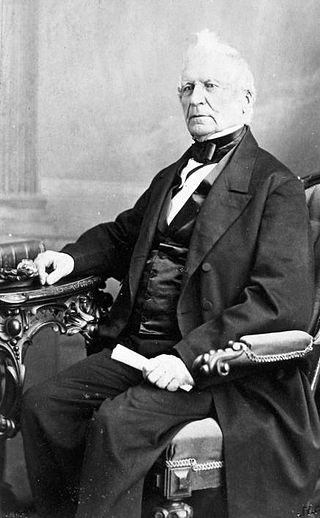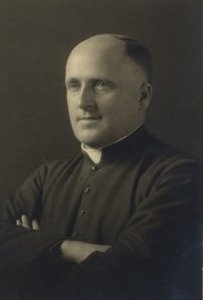
The Université du Québec à Montréal, is a French-language public research university based in Montreal, Quebec, Canada. It is the largest constituent element of the Université du Québec system.

Louis-Joseph Papineau, born in Montreal, Quebec, was a politician, lawyer, and the landlord of the seigneurie de la Petite-Nation. He was the leader of the reformist Patriote movement before the Lower Canada Rebellion of 1837–1838. His father was Joseph Papineau, also a politician in Quebec. Papineau was the eldest of eight children and was the grandfather of the journalist Henri Bourassa, founder of the newspaper Le Devoir.

The Institut canadien de Montréal was founded on 17 December 1844, by a group of 200 young liberal professionals in Montreal, Canada East, Province of Canada. The Institute provided a public library and debating room for its members. At the time, there were no French-language universities nor public libraries in Montreal. Between 1845 and 1871, some 136 lectures were held inside the Institute's walls. The Institute eventually came into conflict with the Roman Catholic Church over the contents of its library. Partly as a result of the dispute with the Church, the Institute eventually folded in the 1870s.

The Université du Québec à Rimouski is a public university located in Rimouski, Quebec, Canada with a campus in Lévis.

Pierre Dansereau was a Canadian ecologist from Quebec known as one of the "fathers of ecology".

The Prix Albert-Tessier is an award by the Government of Quebec that is part of the Prix du Québec, given to individuals for an outstanding career in Quebec cinema. It is awarded to script-writing, acting, composing music, directing, producing and cinematographic techniques. It is named in honour of Albert Tessier.
Léa Pool C.M. is a Canadian and Swiss filmmaker who taught film at the Université du Québec à Montréal. She has directed several documentaries and feature films, many of which have won significant awards including the Prize of the Ecumenical Jury, and she was the first woman to win the prize for Best Film at the Quebec Cinema Awards. Pool's films often opposed stereotypes and refused to focus on heterosexual relations, preferring individuality.
La Fémis is a French grande école and the film and television school of PSL Research University.

The Cinémathèque québécoise is a film conservatory in Montreal, Quebec, Canada. Its purpose is to preserve, document, film, and television footage and related documents and artifacts for future use by the public. The Cinémathèque's collections include over 35,000 films from all eras and countries, 25,000 television programmes, 28,000 posters, 600,000 photos, 2,000 pieces of historical equipment, 15,000 scripts and production documents, 45,000 books, 3,000 magazine titles, thousands of files, as well as objects, props, and costumes. The conservatory also includes a film theatre, which screens rarely seen films and videos.

The Mel Hoppenheim School of Cinema, a division of the Faculty of Fine Arts at Concordia University, is a film school located in Montreal, Quebec. Informally known as MHSoC, the school accepts around 250 students a year for programs in animation, film production and film studies. It is the largest and oldest university-based centre for the study of film, television and media in Canada.
Fernand Dansereau is a Québécois film director and film producer.
À St-Henri le cinq septembre is a 1962 National Film Board of Canada (NFB) documentary film directed by Hubert Aquin about the first day of school for children and their families in the working class Montreal district of Saint-Henri. As Aquin was primarily a writer, he worked with a variety of cameramen. The NFB credits 11 on the film—Guy Borremans, Michel Brault, Georges Dufaux, Claude Fournier, Bernard Gosselin, Jean Roy, Claude Jutra, Bernard Devlin, Arthur Lipsett, Don Owen and Daniel Fournier. Caroline Zéau in her book L'Office national du film et le cinéma canadien (1939-2003): éloge de la frugalité states that as many as 28 filmmakers worked on the project, including the entire French production team, with Jacques Godbout reading narration.
Christian de la Cortina Castaneda is a Canadian actor, film producer, writer, and director.

Rémy Huberdeau is a Canadian filmmaker from Winnipeg, Manitoba. He is transgender, and many of the films he has worked on or directed touch upon the topic of being transgender. He is currently based in Toronto, Ontario, Canada. He has worked on films in both French and English.

Twilight is a 2007 Canadian comedy-drama film, directed by Fernand Dansereau. The film stars Monique Mercure as Madeleine, a woman suffering from Alzheimer's disease who travels to the Gaspé region of Quebec where she plans to commit suicide, and Suzanne Clément as Zoé, a troubled younger woman whom she befriends with transformative effects on both of their lives.
The Iris Tribute Award is an annual award presented by Québec Cinéma, as part of its Prix Iris program, as a lifetime achievement award for distinguished accomplishments in the Cinema of Quebec.
Jack and Jacques is a Canadian short drama film, directed by Marie-Hélène Copti and released in 2006. The film stars Pierre Lebeau as Jacques Jobin, a mediocre actor from Quebec who has been cast in a small part as a Native American in a Western film starring Jack Nicholson, and is being interviewed by student filmmakers Pat Beauséjour and Annie St-Gelais about his experiences on set and his hopes that the role will provide the career breakthrough that's always eluded him.
Jani Bellefleur-Kaltush is an Innu filmmaker from Nutashkuan, Quebec, Canada. She is most noted as director of Do Not Tell , which was the winner of the Best Short Documentary award at the 2010 ImagineNATIVE Film and Media Arts Festival, and co-director with Julien G. Marcotte of Katshinau , which won the award for Best Canadian Short Film at the 2023 Vancouver International Film Festival and was named to the Toronto International Film Festival's annual year-end Canada's Top Ten list for 2023.
Khoa Lê is a Canadian-Vietnamese film director, stage director, producer and screenwriter based in Montreal.









